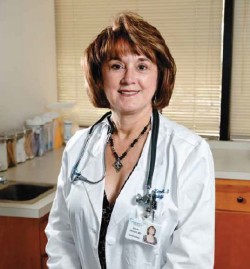Susan Hemelt, M.D.
Women’s Health: A local gynecologist opens the lines of communication with her patients.
 During her residency at Tulane University, New Orleans-born Dr. Susan Hemelt chose to specialize in obstetrics and gynecology due to the field’s diverse range of daily work. “I liked the female patients, and I liked the fact that you had a nice office practice,” she says.
During her residency at Tulane University, New Orleans-born Dr. Susan Hemelt chose to specialize in obstetrics and gynecology due to the field’s diverse range of daily work. “I liked the female patients, and I liked the fact that you had a nice office practice,” she says.
For 23 years, Dr. Hemelt practiced medicine on the West Bank alongside her husband (who is also a physician). In 2009, the couple accepted an opportunity to move to Heidelberg, Germany, and work on a U.S. Army base there. “Having never been in the military, [it] was a unique experience,” she says.
When the Army base closed in spring 2012, Dr. Hemelt and her husband returned home to New Orleans. In July of that year, Dr. Hemelt joined Crescent City Physicians with a sole focus on gynecology. Leaving the field of obstetrics has allowed her to spend more time with her patients, and she knows it’s a less stressful setup for all involved.
“It’s a different environment for patients, because they can be assured their appointments won’t be canceled because someone’s going into labor,” Dr. Hemelt explains. “I like to have a patient come and sit down across from me in the office and talk.”
Dr. Hemelt makes a point of staying in touch with patients, and she emphasizes that a yearly exam is critical to maintaining a woman’s health. “Contact is important, because things change between one year and the next,” she says.
Yearly Exams:
Every woman should see her gynecologist for a yearly exam, beginning at the age of 21 or when she becomes sexually active. This appointment includes breast and pelvic exams, and may or may not include a Pap smear (depending on a patient’s age and medical history).
In addition, the yearly exam is an opportunity for a woman to discuss contraception and birth control with her doctor, finding the method that works best for her. “It’s nice to be able to offer and explain all of the options,” Dr. Hemelt says.
During the yearly exam, Dr. Hemelt also discusses family history and risk of disease, including osteoporosis and cancer.
Colonoscopy:
Starting at the age of 50, women should schedule a yearly colonoscopy. Dr. Hemelt notes that if a woman has an immediate family member who was diagnosed with colon cancer, she should subtract 10 years from that family member’s age at diagnosis, and schedule her first colonoscopy at that age.
